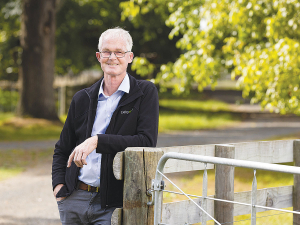OSPRI's costly software upgrade
Animal disease management agency OSPRI has announced sweeping governance changes as it seeks to recover from the expensive failure of a major software project.
 DairyNZ chair Jim van der Poel says one independent BW, with genomics, will give farmers the most accurate data.
DairyNZ chair Jim van der Poel says one independent BW, with genomics, will give farmers the most accurate data.
OPINION: A single accurate, independent national animal evaluation index that incorporates genomic information is key to increasing profits for Kiwi dairy farmers.
We all want BW – and our genetic gain – to be the best it can be for our dairy farmers. One independent BW, with genomics, will give farmers the most accurate data and lead to the most genetic gain.
One national animal evaluation index will ensure breeding decisions are made consistently, with economic and environmental benefits for dairy.
There are currently three Breeding Worth (BW) animal evaluation indexes being used in the sector, and they are not all equal. This creates confusion for farmers around which BW to use and is one of the key reasons why New Zealand’s rate of genetic gain is not improving.
Our genetic gain is steady, but we can do better. Slow and inconsistent uptake of genomics has meant our herds have lagged behind those of our competitors, such as Australia, the UK and the US. We want to change that. That’s why DairyNZ, through New Zealand Animal Evaluation Ltd (NZAEL), is looking to improve its BW to include genomics.
Genomic information enables early trait predictions and helps dairy farmers make good breeding decisions, to increase the genetic gain of their herds and lift farm profit. Early trait predictions enable farmers to find the best bulls sooner and make better breeding and culling decisions based on trusted information.
The independence of NZAEL helps give dairy farmers confidence. It aims to ensure the New Zealand dairy herd is resilient and our rates of genetic gain are internationally competitive.
That’s our vision.
With that in mind, we propose a BW system that:
NZAEL, a DairyNZ subsidiary, would deliver this single BW system as an industry-good, credible source of data available to everyone. We believe this will give farmers the most accurate data to compare bulls and cows, building their confidence and increasing genomics use in New Zealand.
NZAEL, a DairyNZ subsidiary, would deliver this single BW system as an industry-good, credible source of data available to everyone. We believe this will give farmers the most accurate data to compare bulls and cows, building their confidence and increasing genomics use in New Zealand.
Understanding farmers’ needs and challenges is key to NZAEL’s work, so we’re seeking dairy farmer feedback on how to ensure our proposed BW system is fair for all users and will help the sector achieve a better rate of genetic gain.
A consultation is underway until June 27 to seek dairy farmer and sector feedback on this proposed operating model over the next six weeks. Visit https://www. dairynz.co.nz/better-BW to share your thoughts on the proposed BW system.
For more information on NZAEL and its work, visit Animal Evaluation – DairyNZ.
Jim van der Poel is chair of DairyNZ
Donald Trump's latest tariff tantrum has again thrown the world of trade into a new round of turmoil and uncertainty, and NZ is caught up in it.
The third edition of the NZ Dairy Expo, held in mid-February in Matamata, has shown that the KISS principle (keep it simple stupid) was getting a positive response from exhibitors and visitors alike.
Twenty years ago, South African dairy farm manager Louis Vandenberg was sent to a farm in Waikato to provide training on Afimilk technology.
Strong farmgate milk price is helping boost investment on farms, says PGG Wrightson chief executive Stephen Guerin.
Fonterra's 460 milk suppliers in Australia, who will switch to Lactalis end of this month, are unfazed with the impending change.
The 5+ A Day Charitable Trust has launched a collection of affordable recipes designed to turn everyday vegetables into seasonal stars.
OPINION: Is it a case of over promising and under delivering? Farmers think so.
OPINION: The UK dairy industry is celebrating a win after plant-based drink maker Oatly lost a long-running legal battle over…